Advocacy Department
Introduction
The Advocacy Department mobilizes civil society to lobby governmental stakeholders to increase investment in mental health and enact legislations and policies to improve the mental health landscape in Pakistan. The aim of Taskeen’s other departments have been to develop impactful and cost-effective models that can be sustained and scaled. However, we are cognizant of the fact that we cannot achieve true scale unless we partner with the government. In addition, there are structural barriers that prevent access to quality mental health services that can only be addressed at the policy level, which is why the advocacy department was developed and launched in March 2020.
Key Achievements
Suicide Decriminalisation in Pakistan
Until 2022, Pakistan was one of the 20 countries where suicide was criminalized under Section 325 of the Pakistan Penal Code, leading to legal and social consequences for survivors. Through persistent lobbying, engagement with religious scholars, and advocacy at legislative levels, the law was repealed, recognizing suicide as a public health issue rather than a criminal act.
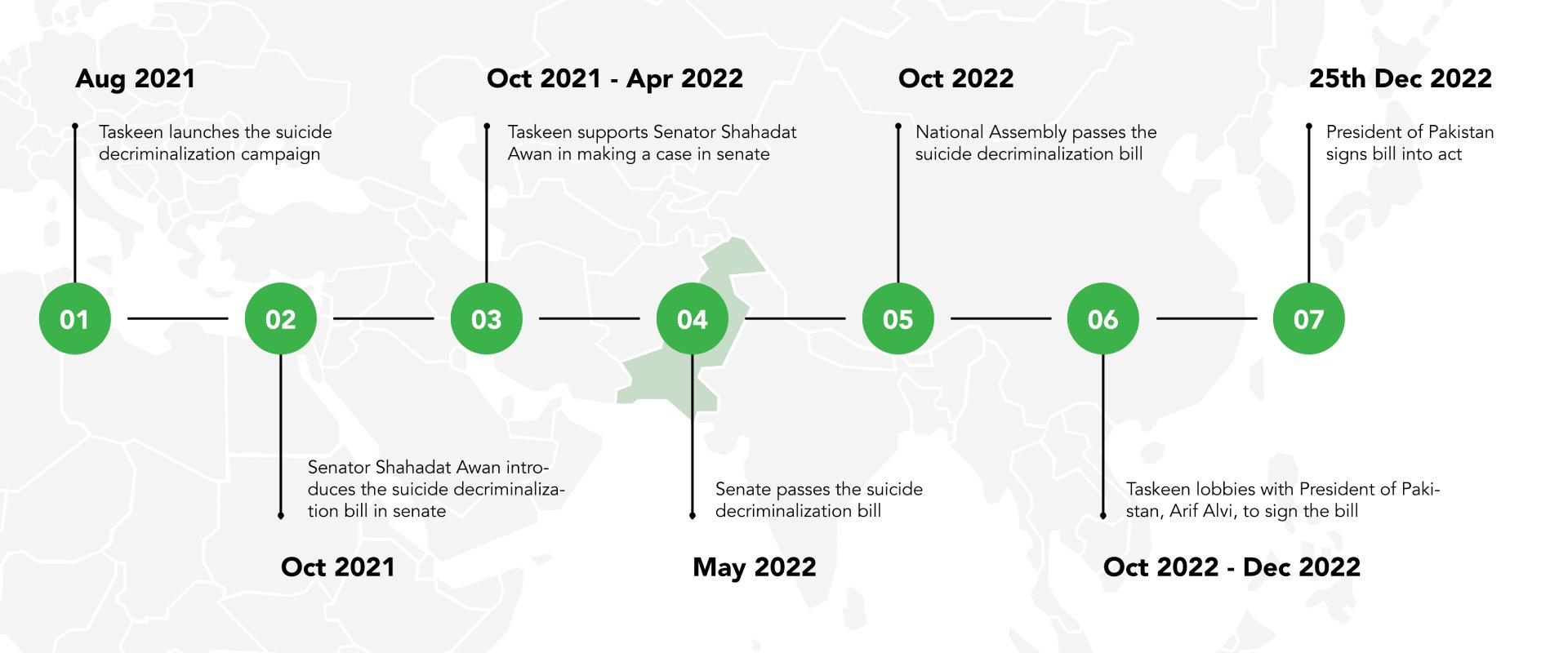
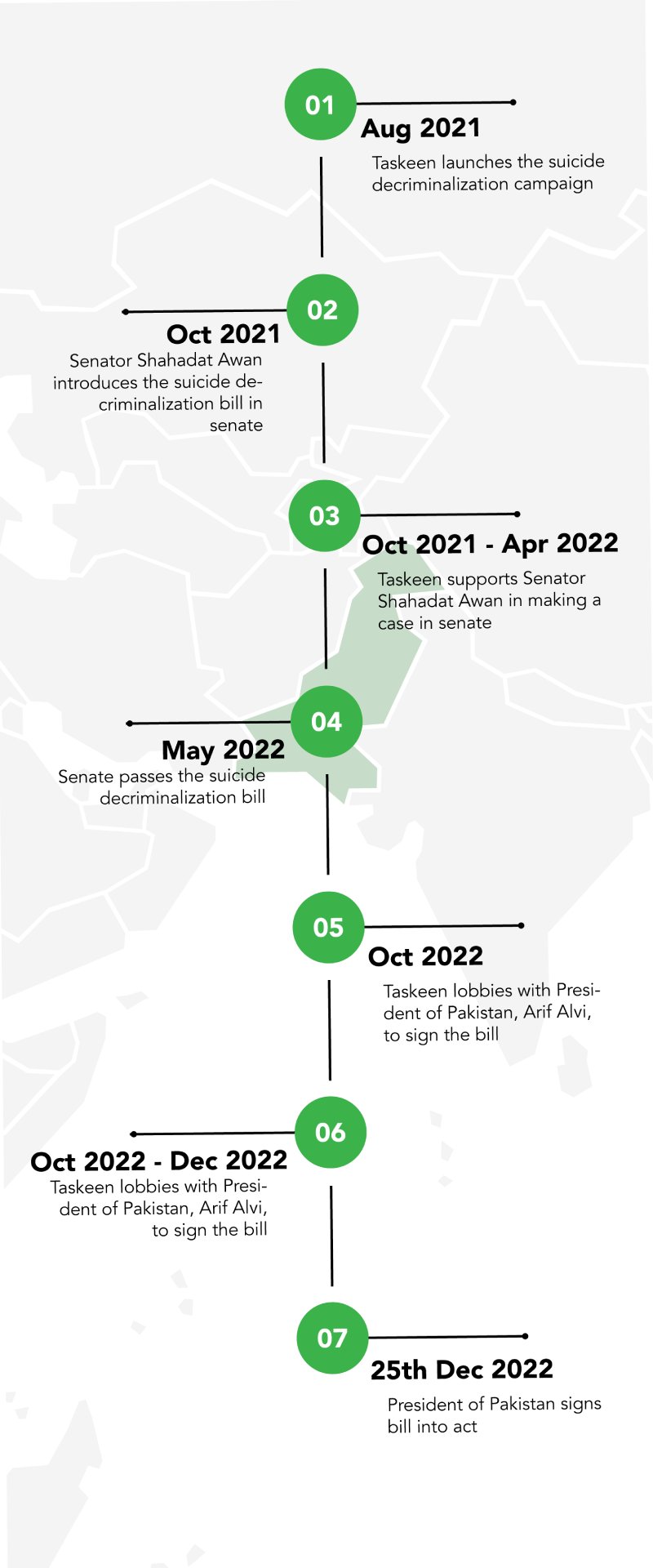
Pakistan Mental Health Coalition (PMHC)
Taskeen is a founding member and the co-secretariat of the PMHC which serves as a network for mental health advocacy, bringing together mental health experts, organizations, and policymakers to drive systemic change and improve mental healthcare in Pakistan.
Global Mental Health Action Network (GMHAN)
Taskeen represents Pakistan as a key partner in the Global Mental Health Action Network, contributing to global discussions, chairing working groups and advocating for policy reforms and innovative approaches to strengthen mental health systems.
National Mental Health Helpline Protocols’ Development
Taskeen participated in the “Working Group on the National Mental Health Crisis” established in October 2022 by the President of Pakistan and spearheaded the development of protocols outlining best practices for a National Mental Health Helpline.
Representation at the World Health Organization
Taskeen has been representing Pakistan and advocating for mental health at the World Health Organization since 2021 featuring in various meetings and discussions including at the WHO EMRO region and WHO Global.
Current Priorities
Regulating Mental Health Services in Healthcare Facilities
Pakistan’s mental health services remain largely unregulated, leading to exploitation, malpractice, and unjust institutionalisation. We are working to establish minimum service delivery standards with relevant stakeholders to ensure accountability, ethical practice, and quality care.
Inclusion of Mental Healthcare in Emergencies
Pakistan faces frequent disasters, affecting millions of people annually, yet lacks an integrated MHPSS system in its emergency framework. We are advocating for MHPSS inclusion to ensure timely psychological support, structured referrals, and long-term care for affected populations.
Licensing of Allied Mental Health Professionals
Pakistan lacks a licensing system for psychologists, counsellors, and social workers, allowing unqualified individuals to practice. We are pushing for standardized licensing to ensure professional accountability, protect patients, and improve service quality.
National Mental Health Policy Development
Pakistan requires comprehensive mental health policies to ensure effective implementation and accessibility of mental health interventions. We are working with governmental stakeholders to push for holistic mental health policies that foster a supportive and well-regulated environment for mental well-being across the country.
Implementation of Suicide Decriminalisation
Since suicide is now legally decriminalized in Pakistan, Taskeen is now working on effective implementation by training law enforcement and medico-legal professionals to ensure a compassionate and systemic response to suicide prevention in Pakistan.
Integration of Mental Health in Universal Health Care
Another key focus area is scaling the models of mental health awareness and support we have developed (mental health helpline, school mental health program, integration of mental health in primary care) by integrating them into governmental programs particularly the universal health care interventions that are being developed by the government.
Partnerships and Alliances




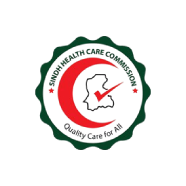

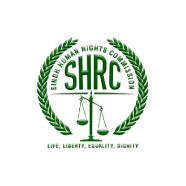
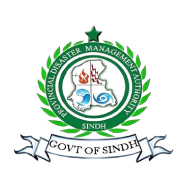
Partnerships & Alliances
Partnerships & Alliances
Lorem Ipsum is simply dummy text of the printing and typesetting industry. Lorem Ipsum has been the industry’s standard dummy text ever since the 1500s, when an unknown printer took a galley of type and scrambled it to make a type specimen book. It has survived not only five centuries, but also the leap into electronic typesetting, remaining essentially unchanged. It was popularised in the 1960s with the release of Letraset sheets containing Lorem Ipsum.
Partnerships & Alliances
Lorem Ipsum is simply dummy text of the printing and typesetting industry. Lorem Ipsum has been the industry’s standard dummy text ever since the 1500s, when an unknown printer took a galley of type and scrambled it to make a type specimen book. It has survived not only five centuries, but also the leap into electronic typesetting, remaining essentially unchanged. It was popularised in the 1960s with the release of Letraset sheets containing Lorem Ipsum.
FAQ
Here you will find the answers to the frequently asked questions.
What is the difference between advocacy and awareness?
Advocacy encompasses raising awareness by actively working to influence policies, systems, and decision-makers to bring about change. Awareness only focuses on informing and educating people about an issue, while advocacy involves strategic actions like lobbying, policy engagement, and mobilisation to create tangible impact.
What are some effective tools for advocacy?
Advocacy tools include policy briefs, petitions, public campaigns, forming working relationships with relevant stakeholders, social media activism, storytelling, research reports, media engagement, and coalition-building. The choice of tools depends on the target audience and the advocacy goals.
Why is mental health a critical issue in Pakistan?
Mental health disorders, including depression, anxiety, and substance use, affect millions in Pakistan. However, due to stigma, lack of awareness, and limited services, many people do not receive the help they need. Mental health advocacy ensures that these issues are recognized and addressed through effective policies.
How can advocacy help ensure the successful implementation of mental health policies?
Advocacy can drive policy implementation by holding governments accountable, mobilising resources, raising public awareness, and pushing for legislative or structural reforms. Engaging media, civil society, and grassroots organisations strengthens pressure on authorities to act.
How can individuals contribute to advocacy efforts?
Individuals can support advocacy by staying informed, sharing credible information, signing petitions, engaging in community discussions, reaching out to policymakers, volunteering with advocacy groups, and participating in campaigns. Grassroots efforts can collectively drive significant change.
